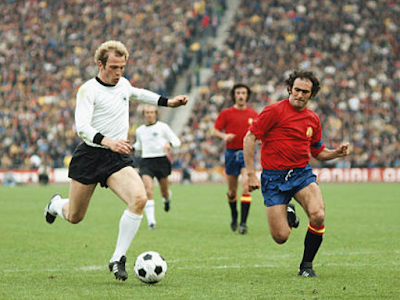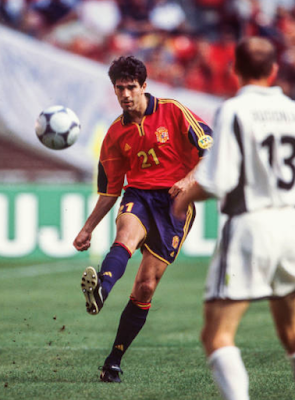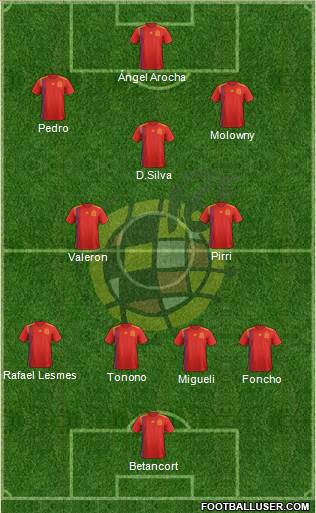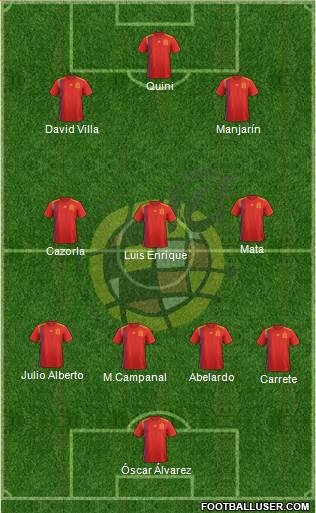This blogger Artur Yanturin of Russia copied many of my blog teams. This blog was one of them. It was my Russia All-Time Team here. His team was written in 2020, but mine was uploaded in 2014. His Spartak Moscow All-Time team entry of was published in October 2020, but mine was uploaded in 2017. His entry of the Dutch-German rivalry between Real Madrid and Barcelona was written in 2020, but mine was uploaded in 2014. He also copied many many of my blog entries.
 |
| David Silva and Pedro |
Please also see my All-Time World Cup Team Index.
Basque, Catalonia, Castile without Madrid players, Madrid Community, Andalusia, Valencian Community, Galicia, Extremadura, Murica, Aragon.
This is my selection of all-time 23 member team for the Canary Islands, Ceuta and Melilla.
Both Ceuta and Melilla are Spanish enclaves sat on the northern shores of Morocco's Mediterranean coast. Together they form the European Union's only land borders with Africa. The Canary Islands are closer to Africa than they are to Europe and so geographically they are part of the African continent. I stopped short of calling this team "Spanish Northern Africa" or "Spanish Africa". Plazas de soberanía is a term describing a series of Spanish overseas minor territories scattered along the Mediterranean coast bordering Morocco or that are closer to Africa than Europe. However, this is about football and none of these territories factored much in the football world.
The two main football teams in the Canary Islands are CD Tenerife and UD Las Palmas. They are two of the most geographically isolated European professional clubs. Ceuta and Melilla do not have any significant football clubs. They played mainly in the lower division.
Team
GK: Antonio Betancort (Canary Islands)
Antonio Betancourt played as a goalkeeper for Las Palmas before moving to Real Madrid in 1961. With Real Madrid, he had two spells with a more lengthy spell between 1963 and 1971. In between, he played for Deportivo La Coruña. He was considered a member of the Ye-Ye team. He was also capped by the Spanish national team. He went to the 1966 World Cup Finals in England as a backup to José Ángel Iribar.
Antonio Betancourt played as a goalkeeper for Las Palmas before moving to Real Madrid in 1961. With Real Madrid, he had two spells with a more lengthy spell between 1963 and 1971. In between, he played for Deportivo La Coruña. He was considered a member of the Ye-Ye team. He was also capped by the Spanish national team. He went to the 1966 World Cup Finals in England as a backup to José Ángel Iribar.
GK: Juan Antonio Pérez Sáez (Canary Islands)
Juan Antonio Perez was born in Las Palmas de Gran Canaria. He started with Tudelano, but he almost spent his entire career with local club UD Las Palmeas between 1974 and 1987. He played mainly in the top division. He spent two seasons with Club Deportivo Logroñés at the end of his career before retiring in 1989.
GK Manuel López Santana "Manolo" (Canary Islands)
Simly known as "Manolo" or "Manolo Lopez", Manolo joined UD Las Palmeas when when he was only 16 years old. He made his debut in 1981. He spent a season with AgD Ceuta, where he set the record of 1,223 minutes without conceding a goal, previously held by Dino Zoff. Then, he spent 5 seasons with Tenerife club, where he was at one point their captain. He is currently the General Director of Sports for the Government of the Canary Islands .
RB: Manuel Pablo (Canary Islands)
Manuel Pablo came from the Canary Islands. He started with his hometown club Las Palmas. He moved to Deportivo La Coruna in 1998, where he almost spent his entire career and helped them to win their first ever la Liga title in 2000. He retired in 2016 at the age of 40 after over 450 games for them. He was capped 13 times for Spain between 2000 and 2004.
CB/RB: Foncho (Canary Islands)
Foncho began his career with Tenerife in the 1955-1956 season. After a brief stint at Real Murcia and Eldense, he joined FC Barcelona, where he would play for seven years from 1960 to 1967. His team reached the 1961 European Cup Final. He did win the 1963 Generalissimo Cup and the 1965-66 Fairs Cup, He joined Real Zaragoza in the 1967-1968 season. With Spain, he earned 2 caps in 1961.
CB: Migueli (Ceuta)
Migueli was born in Ceuta. He started his career with Cadiz in 1970. In 1973, he joined FC Barcelona, winning the 1979 and 1982 Cup Winners Cup. He spent 20 seasons over there. Known for his physical power, he was nicknamed Tarzan. He had 32 caps for Spain between 1974 and 1980. He went to the World Cup Finals in 1978 as well as Euro 1980 held in Italy. He was named Don Balón Award )Best Spanish Player) for two seasons: 1977–78, 1984–85.
 |
| Migueli |
CB: Paco Jémez (Canary Islands)
Jémez was born in Las Palmas, Canary Islands. During his career, he played for Córdoba CF, Real Murcia, Rayo Vallecano, Deportivo de La Coruña and Real Zaragoza, Paco Jémez, which he helped to the 2001 conquest of the Copa del Rey. Jémez played 21 times for Spain between 1998 and 2001. He was a participant at UEFA Euro 2000, taking part in three matches in an eventual quarter-final exit.
SW: Tonono (Canary Islands)
Tonono made his professional debut with hometown's UD Las Palmas, in 1962. He would only play for one club in his entire career, being part of the squads in the late 1960s and early 1970s that achieved three top-five finishes in the top flight – including the second place in 1969. He was capped 22 times. He did not appear, however, in any major international tournament, as the national team did not qualify for any during his international spell.
LB: Rafael Lesmes (Ceuta)
Over 12 La Liga seasons Rafael Lesmes played for Real Valladolid (two spells) and Real Madrid, appearing in 263 games in the competition. He began his career with local Atlético Tetuán, and retired in 1962 at the age of 35. With Real Madrid, Lesmes was part of the team that won five consecutive European Cups. Lesmes was an unsused player at the 1950 World Cup. In total, he played twice for Spain in 1955 and 1958 respectively.
 |
| Rafael Lesmes |
Juan Guedes was considered one of UD Palmas greatest players. He was born in 1942. He started with Porteño as a youth before he moved to UD Las Palmas Youth Team. At just 18 years old, he made his first team debut in 1961. He played for eight years in the First Division and participated in the 1969-70 Fairs Cup. He became their captain and was considered a "symbol of Canarian football". He died in 1971 at the age of 28. He played twice for Spain.
CM/DM: Jose Pirri (Ceuta)
Jose Pirri is regarded as one of Spain's greatest player. He had 41 caps in a career that lasted 12 years. He played in two World Cup Finals: 1966 and 1978. He played for Real Madrid for 15 years, between 1964 and 1979, winning ten Spanish league titles, four Spanish cups, and the 1966 European Cup. He was a member of the Real Madrid team that was known as the Yé-Yé team. He also played for Granada between 1963 and 1964.
Jose Pirri is regarded as one of Spain's greatest player. He had 41 caps in a career that lasted 12 years. He played in two World Cup Finals: 1966 and 1978. He played for Real Madrid for 15 years, between 1964 and 1979, winning ten Spanish league titles, four Spanish cups, and the 1966 European Cup. He was a member of the Real Madrid team that was known as the Yé-Yé team. He also played for Granada between 1963 and 1964.
 |
| Pirri |
Hilario played for Real Club Victoria before he joined Deportivo de La Coruña in 1928. In 1931 he was transferred to Real Madrid, where he played for five seasons, and won two leagues and two cups. Later, he played Valencia CF and FC Barcelona in between he returend briefly for Deportivo La Coruna. He was capped twice by Spain. He went to the 1930 World Cup Finals.
AM: Juan Carlos Valeron (Canary Islands)
Juan Carlos Valeron started his career with La Palmas. He played for Mallocra and Atletico Madrid before he moving to Deportivo La Coruna, where he would play 13 seasons between 2000 and 2013. He was widely considered to be one of the greatest midfielders of his generation, but injuries had limited his career. He only played 46 times for Spain between 1998 and 2005. He went to the Euro 2000, the World Cup Finals in 2002 and Euro 2004.
Juan Carlos Valeron started his career with La Palmas. He played for Mallocra and Atletico Madrid before he moving to Deportivo La Coruna, where he would play 13 seasons between 2000 and 2013. He was widely considered to be one of the greatest midfielders of his generation, but injuries had limited his career. He only played 46 times for Spain between 1998 and 2005. He went to the Euro 2000, the World Cup Finals in 2002 and Euro 2004.
Germán Dévora scored 129 goals, spread over 453 matches in the First and Second Division, the Spanish Cup (Generalissimo and the King), the Copa de Fairs and UEFA Cup for UD Las Palmes. he is their all-time leading scorer. He was a star of their golden team in the 1960's. He was capped 5 times between 1968 and 1972. His debut was against Sweden where he played with Tonono , Juan Guedes and Paco Castellano.
AM/LM: David Silva (Canary Islands)
David Silva became a starter at Valencia in 2006 which forced Palbo Aimar to leave the club. In 2010, he joined Manchester City helping the club to win their first Preimership in over 40 years. For Spain, he had over 120 caps from 2006 onward. He was a key player throughout the period as Spain won the "triple crown": two European Championship and a World Cup. He also represented Spain at every major tournament from 2008 onward.
 |
| David Silva |
At the age of 17, he joined the Real Club Victoria before he played for Atlético de Madrid from 1946 to 1955, winning two league titles. He moved back home to play for UD La Palmas in 1957. For Spain, Alfonso Silva was capped 5 times. Along with Luis Molowny and Rosendo Hernández, Silva went to the 1950 World Cup Finals in Brazil. Spain finished in fourth position, their best result until the 2010 World Cup.
LW/MF: José Padrón (Canary Islands)
José Padrón played for RCD Español, Sevilla FC and FC Barcelona before going to France. After leaving French team Cannes in 1937, he signed for Sochaux in Ligue 1, where he won the 1937–38 championship. Padrón played 5 times for Spain, scoring two goals. One of his cap was against England in 1929, where England lost their first ever away match outside the British Isles.
LW/FW: Vitolo (Canary Islands)
Vitolo began his career with Las Palmas before joining Sevilla in 2013, where he won three straight Europa League in 2014, 2015 and 2016. He signed with Atlético Madrid in 2017, but joined the side in January, 2018. He won the Europa League in his first season and adding the subsequent Super Cup. At the international level, he made his debut for Spain in 2015. He had 12 caps.
Vitolo began his career with Las Palmas before joining Sevilla in 2013, where he won three straight Europa League in 2014, 2015 and 2016. He signed with Atlético Madrid in 2017, but joined the side in January, 2018. He won the Europa League in his first season and adding the subsequent Super Cup. At the international level, he made his debut for Spain in 2015. He had 12 caps.
AM/SS/LW/CM: Luis Molowny (Canary Islands)
In 1946, after winning the Canarian regional championships with Marino FC, Luis Molowny joined Real Madrid. During his 11-year stint in Madrid, Molowny appeared in 198 games all competitions comprised, netting 107 times. He conquered five titles with his main club, including two national championships and the 1955–56 edition of the European Cup. He earned seven caps for Spain while playing in the 1950 World Cup Final.
 |
| Luis Molowny |
FW: Rosendo Hernández (Canary Islands)
Hernández started playing football with local Canary Islands clubs SD Tenisca and CD Mensajero. From 1950 to 1952, Hernández competed almost exclusively in La Liga (the exception being the 1950–51 season in Segunda División), representing RCD Español and Real Zaragoza. he gained 4 caps for Spain. He was selected for the 1950 FIFA World Cup,
FW/SS: Paco Campos (Canary Islands)
Campos began his career in 1934 with Marino. After the Spanish Civil War, he moved to Atlético Aviación (now Atlético Madrid), where he played until 1948. In the late 1940s, he was part of the Delantera de la Seda frontline with José Juncosa, Alfonso Silva, Antonio Vidal Caturla and Adrián Escudero. He joined Sporting de Gijón between 1948 and 1952. he scored 5 goals in 6 caps for Spain.
ST: Ángel Arocha (Canary Islands)
Ángel Arocha was a striker highly appreciated by Barcelona fans for his great ability to score goals, scoring 236 goals in 240 games between 1926 and 1933. Arocha was capped twice by Spain where he scored 2 goals. After playing for Barça, he signed for Club Atlético de Madrid between 1933 and 1936. He died fighting on the Balaguer front in the Spanish Civil War in Franco's army.
FW: Pedro (Canary Islands)
Pedro won 20 titles for Barcelona from 2008 to 2015. In 2015, he joined Chelsea in the English Premier League. In 2020, he moved to Italy where he played for AS Roma and Lazio. He was a part of the Spanish national team that won the World Cup in 2010 and the European Championship in 2012. He also participated in the following World Cup and European Championship. He had 65 caps.
 |
| Pedro |
Honorable Mention
Gabriel Jorge (Canary Islands), Jose Perez Garcia (Canary Islands), Manolo Lopez (Canary Islands), Vicente Valcarce (Canary Islands), Diego Rodríguez (Canary Islands), Paco Castellano (Canary Islands), Jose Bravo (Canary Islands), Felipe Martin (Canary Islands), Juanito (Canary Islands), Francisco Lesmes (Ceuta), Jose Bravo (Ceuta), Nayim (Ceuta), Vicente Valcarce (Canary Islands), Antonio Guayre (Canary Islands), Rubén Castro (Canary Islands), Ramoní (Melilla), Pepillo II (Melilla), Ángel López (Canary Islands), Paco Campos (Canary Islands), Machín (Canary Island), Jonathan Viera (Canary Islands), Luis Valle (Canary Islands).
Special Recognitions
Arico Suárez (Canary Islands born Argentine international), Pier (Italian-born player who grew up in the Canary Islands).
Squad Explanation
-- The original idea was to create an all-time team for Canary Islanders only. However, the lack of an adequate leftback forced me to reconsider my idea. So in the end, I combine this team with Ceuta and Melilla. The Canary Islands is geographically closer to Africa than Europe. Rafael Lesmes from Ceuta would solved my issue of the lack of a leftback from the Canary Islands.
-- I almost selected Arico Suárez who a defensive left-half player. He was born in Gran Canaria who represented Argentina in the 1930 World Cup Finals, making him the first Canary Islander to play in the World Cup. However, I could not drop several local hero. So I stayed with an all-Spanish international team. I have different criteria for different teams to fill holes Lorenzo Fernández and José Santamaría of Uruguay were on my Galicia All-Time team because the team needed players from their position.
-- I used overseas Basque and Catalan players for my respectively all-time teams. I found many information on these players online. However, the ethnicity from those regions is different from the other ethnicity in Spain. So I am using birth place as my criteria for this team. All players must be born in the three regions.
-- I also considered changing this team into the Spanish Island All-Time team that also included the Balearic Island. The Balearic Islands also did not have enough players to form their own all-time team. Miguel Nadal would boost this team, and I could also select Albert Riera for my leftback position. However, the name Spanish Islands are seldom mentioned anywhere. The two island groups were far away from each other. On the other hand, the Canary Islands is a part of the African continent. So a Spanish African or Spanish North African all-time team seems more logical. Besides, Pirri, and Migueli would make a powerful team with David Silva and Juan Antonio Valeron.
-- At the time of writing, Melilla only produced a single Spanish international. Ramoní who starred for Sevilla in the 1950's played twice for Spain in 1952 against Argentina and Germany respectively. He played club football with Mellia-born Pepillo II in Sevilla. Pepillo II spent a few seasons with Real Madrid. He played for the national B team 9 times, but never played for the senior side. No footballer from Melilla was selected onto this team. The two players mentioned were put on honorable mention.
-- A website listed Hilario Marrero, Ángel Arocha, José Padrón, David Silva, Pedro Rodríguez, Vitolo Rosendo Hernández, Luis Molowny, Juan Guedes, Tonono and Juan Carlos Valerón as Canary Islands' greatest footballers. Jonathan Viera was also mentioned, but I bypassed him for older players. He only made on honorable mention.
-- David Silva was a part of Spain's triple crown team from 2008 and 2012. Pedro Rodríguez was not on the 2008, but played on both 2010 World Cup Finals and Euro 2012.
-- Spain finished 4th at the 1950 World Cup Finals. It was Spain's best position for 60 years until they won the World Cup in 2010. The roster included Rafael Lesmes, Luis Molowny, Rosendo Hernández and Alfonso Silva.
 |
| 1950 World Cup team |
-- CD Tenerife did not feature as many native-born players. Ángel Arocha and Foncho played for them.
-- Goalkeeper Antonio Betancort was famous due to being a part Real Madrid's Ye-Ye team. He did not play in the 1966 European Cup Final, but was the hero of the semi-final. Jose Perez Garcia was one of the most important goalkeepers in the history of Hercules, but I went with two goalkeepers who were heros of clubs in the Canary Islands. Juan Antonio Pérez Sáez played many games for Las Palmes. Manuel López Santana "Manolo" is often considered to be CD Tenerife. Manolo Lopez was basically the only other goalkeeper of note I found.
-- Leftback Robert Carlos was born in Santa Cruz de Tenerife. Of course, he is not the same Roberto Carlos of Brazil and Real Madrid. He played in the lower division for Tenerife, Malaga B, etc. At one point, he was one of two leftbacks I found from Canary Islands. Vicente Valcarce who spent many seasons with Malaga was the most famous of the two. In the end, I decided players to expand this team to include players from Ceuta. Rafael Lesmes was part of the Real Madrid team that won five consecutive European Cups. For rightback, I simply took Manuel Pablo who earned more caps than Ángel López. He was also on my Deportivo La Coruna All-time team. Foncho could also play on the right. So I only took a single rightback.
-- For central defenders, Migueli stood out as probably the most famous from Canary Island. Tonono with over 20 caps was for many years the most capped Canarian player. Franz Beckenbauer described him as one of the best defenders of his time. Then, I took Foncho, simply because he was better known. He spent 7 seasons for Barcelona in the 1960's. He played in the 1961 European Cup Final.
-- Paco Castellano was Tonono's clubmate with Las Palmas where they were considered the Golden period of Canarian football, but I decided to put him on honorable mention along with Felipe Martin. Instead, I chose between two more modern players, Juanito and Paco Jémez. I selected Paco Jemez because he had 21 caps.
-- For midfielders, Pirri needed no introduction. Arico Suárez would have been the obvious choice, but I decided not to select Canary-born players who played for the other nations. He was described as a defensive player.
-- Juan Guedes was legend at La Palmas while Hilario Marrero was listed as one of the Canary Islands' greatest players.
-- People had high hopes for Jese Rodriguez. He was tipped to be the next big time with Real Madrid, but he played one good season. I am undecided if he should be put on honorable mention.
-- Pedro and Afonso Silva played on the right side. Alfonso Silva was a star right wing-half for Atletico Madrid. AM/SS/CM: Luis Molowny was an inside-left. He could be an attack midfielder or left wing. He was known for his crosses. His surname originated from County Clare in Ireland. The spelling of the name was a variation for Maloney.
-- Juan Antonio Valerón broke Tonono's record of international caps for Canary Islanders. Valeron alongside Luis Molowny and David Silva almost kept out German Dévora of the team. In the end, I dropped rightback Ángel López for Devora. Devora was a local club legend. And I also decided to keep this team all Spanish international because of Devora. Arico Suárez of Argentina would have gotten on this team, but i could not drop Devora.
-- AM: Pier Luigi Cherubino grew up in the Canary Islands, but he was born in Italy. I ruled him ineligible. And I also had Juan Antonio Valerón, David Silva and Luis Molowny ahead of him.
-- Nayim scored a last-minute goal for Real Zaragoza in the 1995 UEFA Cup Winners' Cup Final against Arsenal. He was from Ceuta. He made honorable mention. I also did not have space for Eleuterio Santos. He was on my Real Zaragoza all-time team.
-- The left side attack was very strong. Vitolo edged out Jonathan Viera and Machín. Jonathan Viera probably should get into the team, but I went for older players. With Gabilondo and Germán, Machín formed one of Atlético' Madrid's great midfield lines. They were nicknamed "The Three Musketeers". Vitolo is a member of my Sevilla All-Time team.
 |
| Vitolo |
-- Both Rosendo Hernández and Alfonso Silva were on Spain's 1950 World Cup team. Silva was an all-timer with Atletico Madrid.
-- Ángel Arocha joined FC Barcelona as a heir apparent to legendary Paulino Alcántara. He scored 203 goals in 210 matches for FC Barcelona. He is considered one of the leading goal scorers in their history, Then, I took Paco Campos from 1930's was the other realistic option in the forward position. In the late 1940s, he was part of the Delantera de la Seda frontline of Atletico Madrid which also featured Canarian Alfonso Silva. He is the highest scoring player from the Canary Islands in La Liga. He also scored 5 goals in 6 caps for Spain.
-- Paco Campos edged out Miguel González. With Atlético Madrid, Miguel González scored 73 goals in 252 games, winning two league titles and one Cup. He scored 2 goals in 15 games for the Spain national team between 1953 and 1958.
Formation
I lined up the best players. The fullbacks were old-fashioned. Pedro had played on the right wing for Spain while Luis Molowny was a left-sided player. Pirri was a box-to-box midfielder. So i was not sure if I have enough defensive presence on the midfield.













